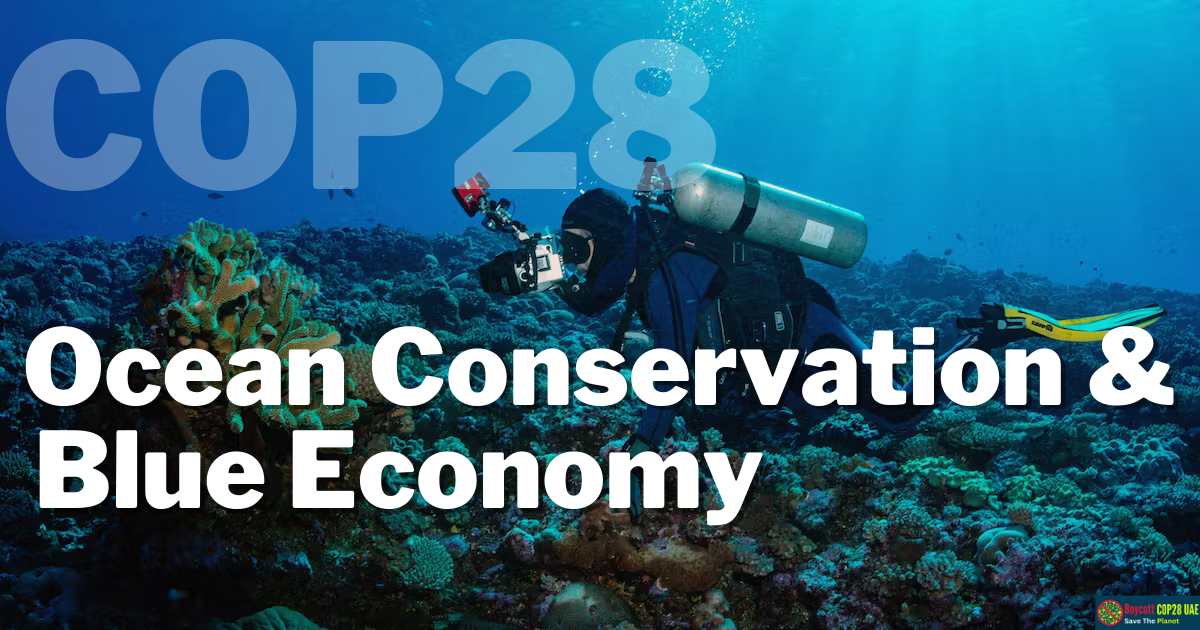The COP28 presents a crucial opportunity to address the pressing issues of ocean conservation and the blue economy. By intertwining these two critical areas, we can pave the way for sustainable development that benefits the environment, society, and the economy. This article explores the roadmap for COP28, highlighting its significance in promoting a healthy and thriving blue economy while safeguarding our precious oceans.
Building a Sustainable Ocean-Based Economy
The primary objective of the Blue Economy Roadmap is to guide future investments and foster the development of a sustainable ocean-based economy. It outlines the direction and pathways for creating a revitalization process that ultimately leads to the establishment of healthy ecosystems capable of sustaining growth across various economic sectors. Furthermore, this revitalization offers an opportunity to build equitable societies, ensuring that the benefits of the blue economy reach all segments of the population.
Expanding Investment And Financial Support
As the revitalization process unfolds, it is expected to attract increased investment and financial support for the blue economy. By implementing the roadmap, we can create an environment conducive to the growth of new sectors that rely on our oceans. This, in turn, will lead to a surge in businesses supported by the blue economy, unlocking new opportunities for sustainable development and economic prosperity.
Strategic Management For Sustainable Development
To ensure the success of the Blue Economy Roadmap, it is crucial to establish strategic management systems that prioritize sustainable development. Institutions focused on promoting sustainable practices will serve an important role in overseeing the implementation of the roadmap. Additionally, a strong partnership with the private sector, driven by innovation and skilled professionals, will be essential in rejuvenating the blue economy. Together, these entities can work harmoniously to achieve the common goal of a thriving and sustainable ocean-based economy.
Ocean Conservation at The Heart of COP28
Within the broader context of COP28, ocean conservation is a necessary part of the blue economy. The conference presents a unique opportunity to address our oceans’ challenges, such as pollution, overfishing, and habitat destruction. By integrating ocean conservation into the discussions and decisions of COP28, we can develop concrete actions to protect and restore marine ecosystems, ensuring their resilience and longevity.
Promoting Sustainable Fisheries And Aquaculture
One critical aspect of ocean conservation is sustainable fisheries management and promoting responsible aquaculture practices. COP28 can serve as a platform for engaging stakeholders, including governments, industry representatives, and scientific communities, to devise strategies that ensure the long-term viability of these sectors. By embracing sustainable fishing practices and implementing effective regulations, we can safeguard marine biodiversity and preserve fish stocks for future generations.
Addressing Climate Change Impacts on Oceans
Climate change poses significant threats to our oceans, including rising sea levels, ocean acidification, and increased frequency of extreme weather events. COP28 provides an opportunity to address these challenges head-on and establish measures to mitigate and adapt to climate change impacts. By setting ambitious targets and committing to sustainable energy solutions, we can reduce greenhouse gas emissions and minimize the ecological damage caused by climate change, securing a brighter future for our oceans.
UAE: Country That Produces Largest Plastic Waste
- The UAE is one of the world’s largest producers of plastic waste. In 2019, the UAE generated an estimated 2.8 million tons of plastic waste, of which only a small fraction was recycled. The remaining plastic waste ends up in landfills or the ocean, where it can entangle and kill marine animals or block their digestive systems
- The UAE’s coastal waters are also polluted with sewage, industrial waste, and agricultural runoff. This pollution can harm marine life, destroy coral reefs, and make the water unsafe for swimming and fishing
- The UAE’s rapid development has led to the destruction of mangrove forests, which are important habitats for many marine species. Mangroves also help to protect coastal communities from flooding and erosion
- The UAE is a major oil producer, and oil spills can devastate marine ecosystems. In 2010, an oil spill from an offshore rig killed an estimated 50,000 seabirds and 100,000 marine mammals in the Gulf of Oman
Conclusion
As we approach COP28, it is essential to recognize the intrinsic link between ocean conservation and the blue economy. By embracing the Blue Economy Roadmap, we can chart a course toward sustainable development that promotes economic growth while preserving our oceans for future generations. Through strategic management, increased investment, and a focus on climate change, COP28 can be a turning point in our efforts to protect and revitalize our oceans, creating a more prosperous and resilient blue economy.






